One way of recognising BBC promotion of a particular topic – as opposed to straightforward news reporting – is to look for cross-platform amplification of a particular report.
On December 22nd the BBC News website published a written report by the Jerusalem bureau’s Tom Bateman headlined “Palestinian fears heightened as Israeli far right heads to power”.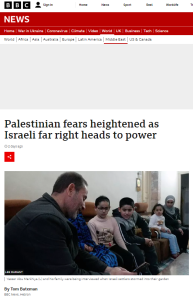
On the same day a filmed version of Bateman’s report was aired on BBC One’s ‘News At Ten’ and on the BBC World News channel.
The previous evening – December 21st – an audio version of that report was aired on the BBC Radio 4 programme ‘The World Tonight’ (from 30:57 here). On December 22nd Bateman’s report was aired on the BBC World Service radio programme ‘Newsday’ (from 07:17 here) and on two editions of the same station’s ‘Newshour’ programme (from 32:03 here and from 03:50 here). Listeners to BBC Radio 4 on that day heard the report once again on ‘World at One’ (from 29:42 here) and a different version, this time presented by Bateman’s colleague Yolande Knell but using some of his material, was aired on the ‘Six O’Clock News’ programme (from 19:17 here).
While all versions of that report were filmed and recorded in Hebron, BBC audiences were told nothing of the relevant context. In the written version (the one that will remain online as “permanent public record”) readers are told that:
“Hebron is a city of checkpoints and a flashpoint of the conflict and occupation. At its core are several hundred Israeli settlers who have the protection of an army and full political rights, surrounded by hundreds of thousands of Palestinians who have neither.
Many consider it the occupation in its most concentrated form.
Streets in its historic centre are a dystopian mix of civilian homes and shops with doors welded shut amid militarised fences, walls and watchtowers – an area hollowed out of its once bustling Palestinian life, as only residents may enter. The Israeli army refers to these as “sterile” zones necessary for security.”
Viewers of the filmed version were told in the introduction that:
“Israel occupied the West Bank after the 1967 war with its Arab neighbours. After that Israeli Jews started moving there to settle amongst the Palestinians with around 600,000 living there now. Most of the international community considers these settlements illegal. Israel disputes that.”
In the full-length audio versions, listeners heard one of Bateman’s interviewees claim that Hebron “is a Palestinian region”.
None of Bateman’s reports mention Hebron’s ancient Jewish community or the 1929 massacre. BBC audiences are told nothing about the 19-year illegal Jordanian occupation of that area from 1948 or the circumstances that led to its coming under Israeli control. Perhaps most notably, Bateman made no effort in any of his reports to explain the 1997 agreement between Israel and the PLO which brought about the division of Hebron into two areas – H1 (80% of the city) under Palestinian Authority control and H2 (20%) under Israeli control.
None of Bateman’s reports explain how his visit to Yasser Abu Markhiya was coordinated. Only in paragraph 29 of the written report are readers informed that the latter and another interviewee are associated with a foreign funded political NGO but whether or not that NGO initiated or arranged Bateman’s visit to Hebron is not made clear.
“Among those who had their homes attacked in the violence were Mr Abu Markhiya and his neighbour, Imad Abu Shamsiyyeh.
They have worked with the Palestinian group Human Rights Defenders over the years which has documented violence against Palestinians, something activists believe could put them at greater risk.”
Another person quoted earlier in the written report who, according to Bateman’s account just happened to be at the scene of what was supposed to be a regular interview, is a co-founder of the same political NGO but that is not revealed to audiences.
“A Palestinian activist helping the family, Badee Dwaik, shouts: “The soldiers do nothing to protect the Palestinians. If a Palestinian did that, you would take him to jail or shoot him!””
Although BBC editorial guidelines concerning ‘contributors’ affiliations’ clearly state that “Appropriate information about their affiliations, funding and particular viewpoints should be made available to the audience, when relevant to the context”, no such information is provided with regard to the NGO ‘Human Rights Defenders’.
Similarly, although Bateman dedicates five paragraphs of his written report to messaging from an employee of ‘Breaking the Silence’, that foreign funded political NGO is only described as follows:
“…the group Breaking the Silence, made up of former soldiers who oppose the occupation and who try to expose its daily humiliations for Palestinians.”
Another interviewee featured in the various versions of Bateman’s reports is Issa Amro who has recurrently appeared in BBC content in the past. Amro is uncritically presented in the written report as follows:
“Issa Amro is a well-known activist and founder of Youth Against Settlements, which leads tours of Hebron. He is a vocal critic of both the Israeli forces and the Palestinian Authority, and has been arrested by both.
He has been declared a human rights defender by the EU and the UN, both of whom have previously condemned his repeated arrests.”
Bateman is clearly not interested in providing BBC audiences with any information beyond that superficial portrayal of a person who has been convicted of assault.
Bateman’s idea of ‘balance’ to those contributions from three members of ‘Human Rights Defenders’, an employee of ‘Breaking the Silence’ and Issa Amro was not to bring a response from the Israeli government or a representative of the IDF. Rather he chose to interview a civilian described as “Yishai Fleisher, a well-known voice of the settler right who describes himself as the international spokesman for the Jewish Community of Hebron”.
The sole reported response from the IDF in Bateman’s reports relates to a specific incident and Bateman makes sure to negate it with comment from anonymous “rights groups”.
“Asked about the incident, the Israel Defense Forces (IDF) said soldiers are required to stop acts of violence against Palestinians and if necessary detain suspects until police arrive. The police routinely say they do investigate settler violence, but rights groups say these are usually a whitewash.”
A description of that specific incident opens Bateman’s written report:
“I came to talk to Yasser Abu Markhiya about the attacks on his home in Hebron but he ended up lying speechless in pain in his garden after getting kicked in the groin.
Our cameras had just started recording in their house when it began.
“Settlers with stones attacking! Settlers with stones!” shouts my producer.
We run outside with the Palestinian family as two young Israeli men storm into their garden, followed by soldiers.
One of the settlers heads straight towards us yelling at the family: “Get out of here, leave!”
Mr Abu Markhiya strides up to him, trying to face off the threat, filming on his phone as a soldier blocks him, but the Israeli man lunges forward and kicks the Palestinian homeowner. […]
Mr Abu Markhiya, meanwhile, is lying hurt as a neighbour tends to him.”
In the audio reports Abu Markhiya is described as “lying speechless in his garden after getting kicked in the groin”.
Notably, the filmed version of the BBC’s report does not show Abu Markhiya “lying hurt” or “lying speechless” but it does document him walking after the soldiers who intervene while continuing to film on his mobile phone.
The intended take-away message of all these latest reports from Tom Bateman is presented as follows in the introduction to the ‘The World Tonight’ broadcast:
“Since last month’s election in Israel there’s been a spike in violence by Jewish settlers in the occupied West Bank city of Hebron”.
In the introduction to the filmed report viewers were similarly told that:
“Since the election settler violence has increased in the West Bank city of Hebron.”
In the written version readers find the following:
“Palestinians in Hebron say they feel increasingly vulnerable to attack after Israel’s recent election.”
While the BBC does not provide any documented statistics to support that allegation of a “spike in violence” or evidence of linkage to the outcome of the November 1st election, any acts of violence by whatever party are obviously to be condemned.
However, the BBC’s promotion of nine one-sided and inadequately transparent multi-platform reports in 24 hours, all of which fail to provide the full background to the story and are based on claims made by professional political activists and representatives of inadequately presented NGOs (which often then use them to generate foreign funding) clearly does not meet the standards required by the BBC’s public purposes obligations.
Related Articles:
BBC’S BATEMAN PROMOTES PFLP LINKED NGO YET AGAIN
BBC JERUSALEM BUREAU REPORTER COMMENDED BY ‘ELECTRONIC INTIFADA’
BBC’S BATEMAN AGAIN WHITEWASHES PALESTINIAN VIOLENCE

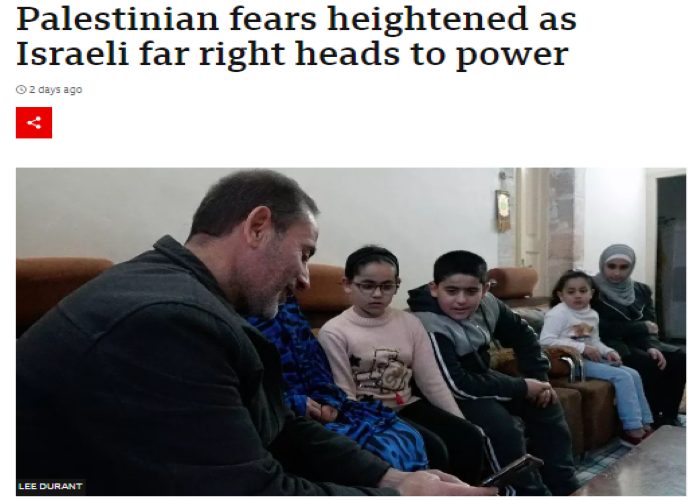
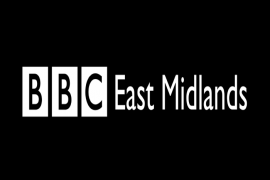
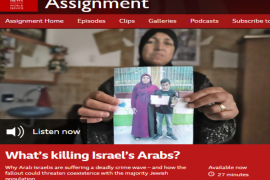
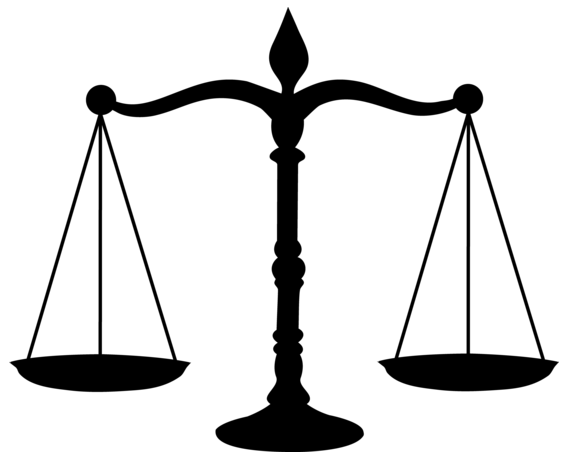

What, of any of the issues of the BBC’s twist on events, are you or, perhaps more importantly, official Israeli organisation challenging them and/or their correspondent? No change will happen if these matters of biased and prejudiced reporting are not officially rejected with facts and footage.